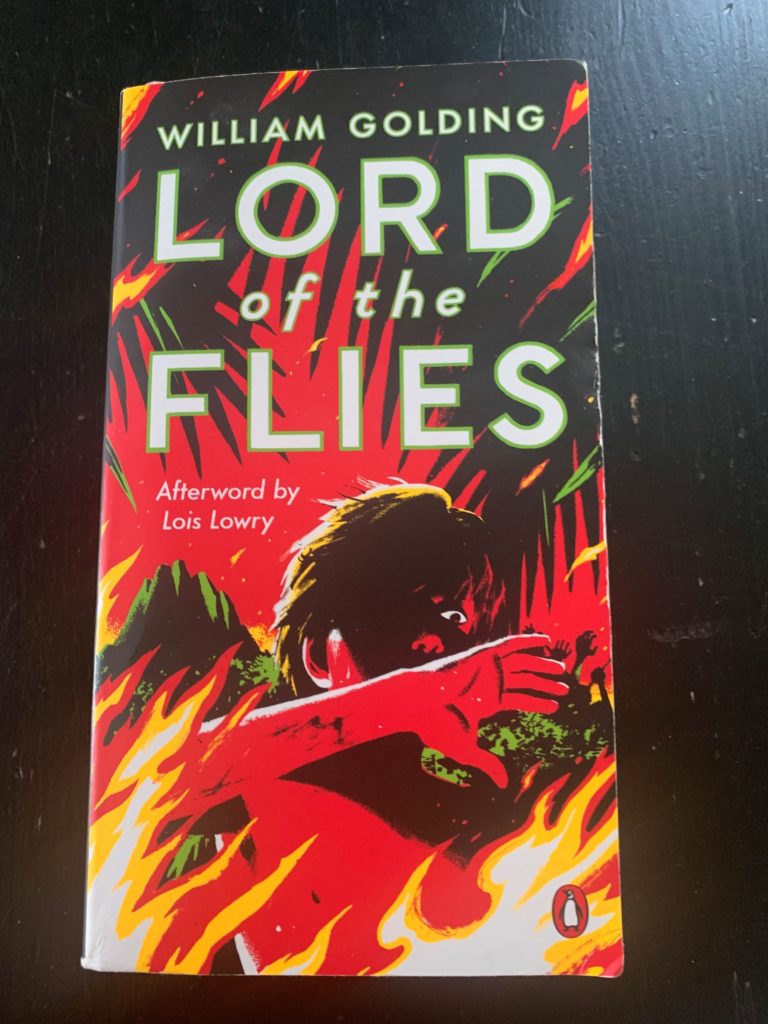My theme is summer now. While we are still about a month from the technical beginning of summer, we have had two weeks of consistent summerlike weather. That being said, a short book is in order because I find myself with more things to do than time to do them. While I have waffled a bit on whether I should do one chapter a week or more, if I can find enough to write about the book fits my pace of the season.

Some of the older boys decide that they are going to build a signal fire so that they increase their chance of rescue. They manage to start a fire using Piggy’s glasses but soon the fire rages beyond the intended limits and now the forest is on fire. One of the unnamed younger kids is apparently missing and the fear is that he was trapped by the fire that they started.
This book is allegedly a commentary on society and human nature. So while it is a smart move to figure out some sort of signaling fire, the reckless or immature nature of twelve year old kids are at play. Essentially, we have preteens building or rebuilding society in this book. It is interesting because I have observed this behavior firsthand in the last couple of years. Which I will talk about further.
In one example, my older son has been in Boy Scouts since the fifth grade. They cross over into Boy Scouts from Cub Scouts late in the fifth grade year (about this time of year). They are immediately thrust into a youth organization that spans ages from about 12-18. Here is what I have observed.
About a third of the kids never make the transition. Scouts becomes something that is not cool and 6th grade is all about fitting in. I think that it is also intimidating to be a grade schooler with high schoolers. Of those there is a second group.
Of the group that goes, about about fifty percent of those attend through middle school. What I have observed is that if they continue with participation and rank advancement, they will probably go all the way. The ones that don’t make it are ones with spotty attendance to meetings and events. It is pretty rare to see a kid participate all the way into adulthood and not make the Eagle rank.
High school is the typical splitting point. I think that it is competition between sports and school activities and commitment to Boy Scouts. If the individual is not vested in rank advancement and is conflicted with other activities, Boy Scouts usually lose. The other side of that coin is that those that are vested, work Boy Scouts into the other activities. So, they might be ‘out’ for football but come back when they can or when the season is over.
My point with all this is that to observe twelve year old kids in a quasi-survival situation or leadership role is pretty enlightening. It could be that back in the 1950s when this book was written, younger kids were more responsible because they had to be. I don’t know, I wasn’t there. I suspect that what has changed is society.
I am not going to get into another gun control debate here but I think it is a perfect example for what I want to say. The number of accidental deaths with firearms is at record lows. I attribute that to a greater awareness of safety and a changed culture. While I would opine for the days you could have a firearm in the gun rack at school, there is no doubt that the movement to keep them locked up at home has had an impact on safety.
I have heard countless stories of ‘I used to hunt on the way home from school’ or ‘I ran a trap line before school’. That was normal, but so were accidents. Now, I don’t mean to say that it was prevalent, but that it was an acceptable fact of life that there were a higher rate of accidents. The culture change of accidents being unacceptable is what has driven the policies and therefore the results.
What I mean to say with all of this is that of course twelve year old’s set the forest on fire. They are not mature enough to think far enough into all of the possible risks and mitigation plans. This is why wisdom is so valuable because it is the experience that teaches us and makes us better. It is also why we as parents need to let our kids fail (safely). Kids will be a lot better served if they start learning as soon as possible and parents that solve all the problems before they occur are doing no favors.
End Your Programming Routine: This is one of the hardest things to do as a parent, letting your kids fail. My son that I referenced earlier got straight As his second semester as a sophomore. His first semester as a Junior, we backed off completely and he got Bs, Cs and an F. It kills me that he is capable but he has to learn it himself. He is one year away from being independent and I just don’t think that he achieve academic success alone at this time. It’s OK that he is not college material, I am not judging that. I just don’t want him to waste his money on something that seems improbable at this point. Yet again, that is something that he will have to decide and learn.
Recent Comments